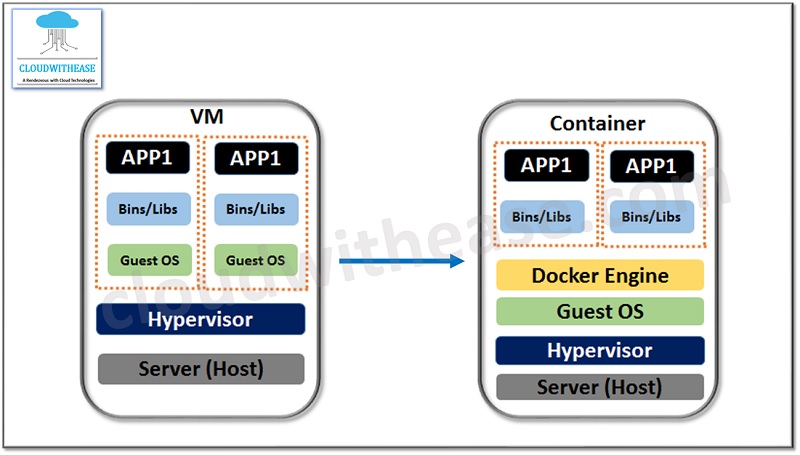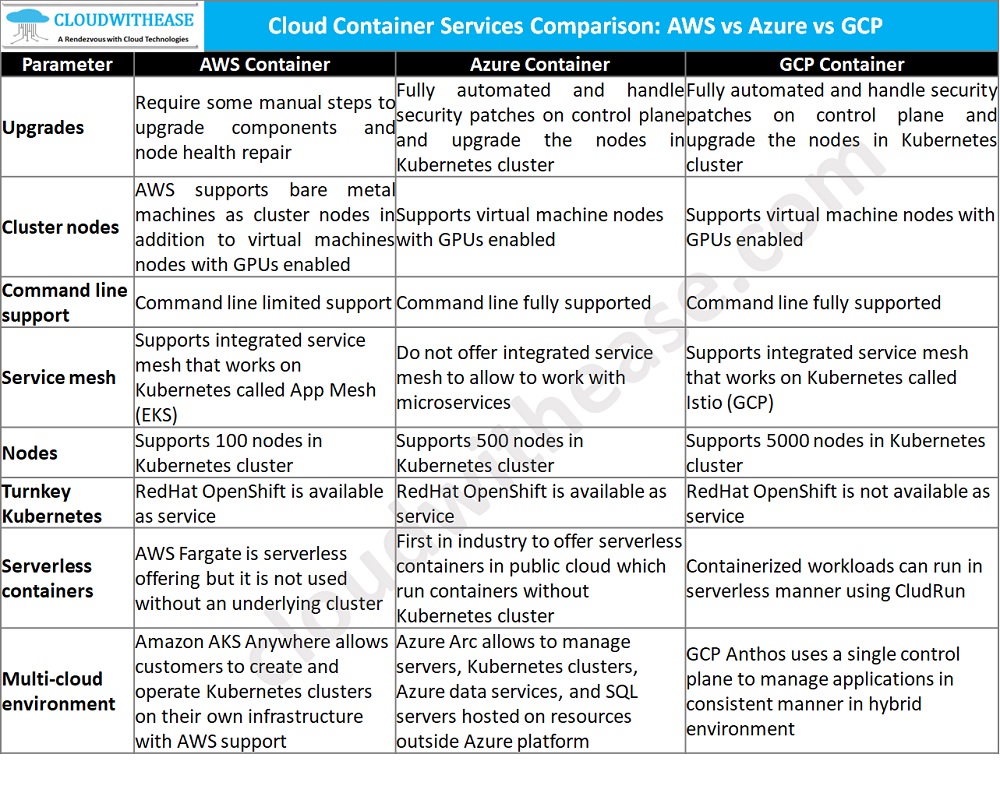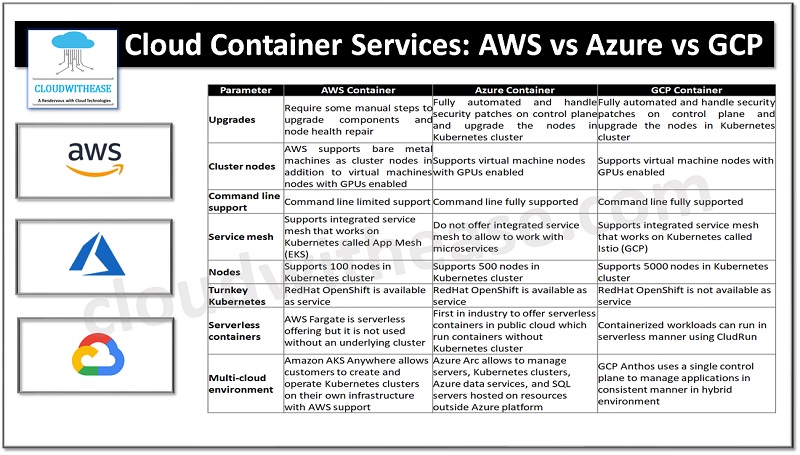Table of Contents
With the emergence of cloud computing many new terminologies and concepts evolved parallelly. The first basic question which comes to mind in cloud computing is about compute and storage of resources. How is that achieved? Can we deploy infrastructure the way we deploy a portable application consisting of several blocks of code work independently, how do we ensure application portability across varied underlying hardware and software? How do we achieve resource isolated processes for quick, reliable, and consistent deployments irrespective of environments.
Today we look more in detail about containers terminology which is widely used by major cloud providers – AWS, Azure, and Google, their key differences, pros and cons.
Introduction to Containers
Cloud Containers are a powerful way to package and deploy applications in the cloud as they are lightweight and consistent, portable software environments for applications to run and scale as per demand. Application code, configurations, and dependencies into a single object. Containers share an operating system installed on server and run as resource isolated resources.

AWS Containers
AWS Containers refers to the container-related services and offerings provided by Amazon Web Services (AWS), the cloud computing platform offered by Amazon. AWS provides a range of services that enable you to deploy, manage, and scale containerized applications in the AWS cloud environment.
The key AWS container services are: ECS, EKS and Fargate. ECS is the best option having little knowledge around containers, for full container experience one can opt for EKS. Fargate is a recent release that lets you deploy containers without managing servers or clusters.
The challenge with EKS lies in its setup process, which demands a certain level of container-related technical expertise.
Amazon Elastic Container Service (ECS)
Amazon ECS is a fully managed container orchestration service that allows you to run and scale containerized applications. It integrates with other AWS services, making it easy to build scalable and highly available applications using containers. ECS supports both Linux and Windows containers.
Features of Amazon ECS Containers
- Container management: ECS provides a highly scalable and reliable platform for deploying and managing containers. It offers features such as task definitions, service scaling, and load balancing.
- Integration with AWS services: ECS integrates seamlessly with other AWS services like Amazon EC2, Elastic Load Balancing, Amazon VPC, Amazon ECR (Elastic Container Registry), and AWS Fargate.
- Flexibility: ECS supports the use of either Fargate (a serverless compute engine for containers) or EC2 instances to run containers, giving you the flexibility to choose based on your needs.
- Container security: ECS provides security features such as IAM (Identity and Access Management) integration, VPC networking, and integration with AWS Secrets Manager for secure storage of sensitive data.
Amazon Elastic Kubernetes Service (EKS)
Amazon EKS is a service that is designed to simplify the deployment and management of Kubernetes clusters on AWS. As a managed Kubernetes service, EKS makes it easy to run containers, leveraging the scalability and flexibility of AWS.
Features of Amazon EKS Containers
- Managed Kubernetes control plane: EKS takes care of managing the Kubernetes control plane, allowing you to focus on deploying and managing your applications.
- Scalability and availability: EKS supports automatic scaling of worker nodes and provides built-in load balancing for distributing traffic to containers.
- Integration with AWS services: EKS seamlessly integrates with other AWS services such as Amazon EC2, Elastic Load Balancing, Amazon ECR, Amazon VPC, and AWS IAM.
- Monitoring and logging: EKS integrates with AWS CloudWatch and AWS X-Ray to provide monitoring, logging, and tracing capabilities for your Kubernetes applications.
AWS Fargate
AWS Fargate is a serverless compute engine for containers, which allows you to run containers without managing the underlying infrastructure. Fargate abstracts the infrastructure layer and enables you to focus on deploying and scaling your containers.
Features of AWS Fargate
- Serverless container deployment: Fargate eliminates the need to provision and manage servers or clusters. You can deploy containers directly to Fargate and let AWS handle the infrastructure management.
- Scalability and elasticity: Fargate automatically scales containers based on workload demands, ensuring that you have the necessary compute resources available.
- Integration with AWS services: Fargate integrates with various AWS services, including Amazon ECS, Amazon EKS, AWS Elastic Load Balancing, and AWS IAM.
- Resource isolation and security: Fargate provides strong isolation between containers, ensuring security and preventing resource contention.
Azure Containers
Azure Containers, also known as Azure Container Instances (ACI) and Azure Kubernetes Service (AKS), are container-related services provided by Microsoft Azure. They enable the deployment, management, and scaling of containerized applications in the Azure cloud environment. Azure container service is slightly slow during deployments but it supports Linux images but at the same time it means you limit only to Linux or windows OS. Azure makes it easy to deploy and give detailed analytics.
Azure Container Instances (ACI)
Azure Container Instances is a serverless container service that allows you to run containers without managing the underlying infrastructure. It offers a quick and easy way to deploy individual containers, making it suitable for scenarios that require rapid scaling, short-lived tasks, or bursty workloads. ACI supports both Linux and Windows containers and provides seamless integration with other Azure services.
Features of Azure Container Instances
- On-demand container deployment: You can quickly deploy containers without provisioning or managing virtual machines.
- Container group: ACI allows you to group multiple containers together and manage them as a single unit.
- Autoscaling: ACI can automatically scale container instances based on CPU or memory usage.
- Integration with Azure services: ACI integrates with various Azure services like Azure Virtual Network, Azure File Share, Azure Storage, and Azure Event Grid.
Azure Kubernetes Service (AKS)
Azure Kubernetes Service is a managed Kubernetes service that simplifies the deployment and management of containerized applications using Kubernetes. It provides a scalable and highly available platform for running containers in production environments.
Features of Azure Kubernetes Service
- Managed Kubernetes cluster: AKS abstracts the complexity of managing the Kubernetes control plane, allowing you to focus on deploying and managing your applications.
- Scaling and load balancing: AKS supports automatic scaling of nodes and containers, as well as built-in load balancing for distributing traffic across your application instances.
- Monitoring and diagnostics: AKS integrates with Azure Monitor and Azure Log Analytics to provide monitoring and diagnostics capabilities for your containers and cluster.
- Integration with Azure DevOps: AKS seamlessly integrates with Azure DevOps, enabling continuous integration and deployment (CI/CD) pipelines for containerized applications.
- Security and compliance: AKS provides features such as Azure Active Directory integration, role-based access control (RBAC), and network policies to ensure secure access and compliance with regulatory requirements.
Google Containers
Google Containers, also known as Google Container Engine or Google Kubernetes Engine (GKE), is a cloud-based container orchestration platform provided by Google Cloud. Containers are lightweight, isolated environments that package an application and its dependencies, allowing for consistent and efficient deployment across different computing environments.
Google Containers leverages Kubernetes, an open-source container orchestration system, to manage and automate the deployment, scaling, and management of containerized applications. With Google Containers, you can easily deploy, manage, and scale containerized applications using a managed Kubernetes service provided by Google Cloud.
Google offers big data , machine learning and artificial intelligence technologies. However, GCP is not that popular as IaaS and does not integrate with IaaS cloud requirements.
Features of GCP Containers
- Managed Kubernetes: Google Containers provides a managed Kubernetes service, allowing you to focus on your applications rather than the underlying infrastructure. Google takes care of managing the control plane, ensuring high availability and reliability.
- Scalability: Google Containers enables you to easily scale your applications by adding or removing containers based on demand. It automatically manages load balancing, distribution, and scaling of containers across your cluster.
- Integration with Google Cloud: Google Containers seamlessly integrates with other Google Cloud services, such as Google Cloud Storage, BigQuery, Pub/Sub, and more. This allows you to build complex, scalable applications using a wide range of cloud services.
- Automated Updates: Google Containers supports rolling updates, allowing you to update your applications without downtime. It automates the process of rolling out new versions of containers, ensuring continuous availability.
- Monitoring and Logging: Google Containers provides built-in monitoring and logging capabilities, allowing you to gain insights into the health and performance of your applications. You can collect metrics, view logs, set up alerts, and perform troubleshooting tasks easily.
- Security and Isolation: Containers running on Google Containers are isolated from each other, providing enhanced security and resource isolation. Google Cloud also offers various security features, including Identity and Access Management (IAM), network policies, and encryption options.
Cloud Container Services Comparison: AWS vs Azure vs GCP

Download the comparison table: Cloud Container Services: AWS vs Azure vs GCP
Quick facts!
Market share – Azure containers (0.62%), Amazon web services containers (80%) and Google cloud containers (1.88%)

